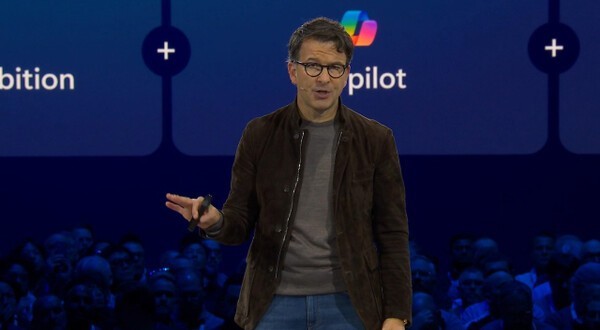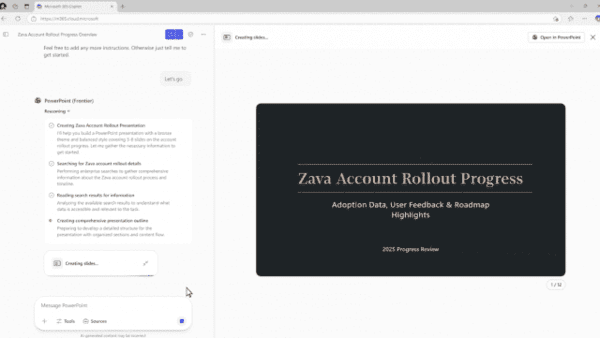Microsoft used its Ignite 2025 conference to introduce dedicated AI agents for Word, Excel and PowerPoint, a move that effectively rewrites the structure of its entire productivity suite. The company is placing AI at the center of document creation, data analysis and presentation design. Users can issue natural-language instructions, and the agents generate drafts, conduct automated reviews, perform edits and verify data inside each Office application.
Microsoft’s message is clear: Office is moving beyond a set of tools and transforming into a platform where workers collaborate with AI as a constant partner.

AI Agents Mark the Start of a Full Redesign of Office
The standout announcement was the debut of Copilot Agents tailored to each Office app. When users give instructions in Copilot Chat, the agent asks follow-up questions to clarify the goal and immediately produces a draft for a document, spreadsheet or slide deck.
The initial output is delivered directly into the app. Editing, restructuring and formatting then unfold automatically within the application environment. It is the first time Microsoft has integrated the full workflow of document production into a unified agent-based system, surpassing the fragmented features offered by earlier versions of Copilot.

Word, Excel and PowerPoint Redefined Through AI
Word: An editor that understands purpose and structure
The Word agent goes beyond text generation. It interprets the purpose of the document, identifies the intended audience and suggests an optimal structure. Additional user instructions are incorporated in real time, and the agent refines the logic, flow and tone throughout the writing.
Excel: Automated calculations and built-in error checking
The Excel agent performs intermediary calculations and repeats data-based reasoning steps to prevent mistakes before they happen. This capability addresses one of the biggest concerns among businesses: the risk of formula errors when relying on AI. The result is improved trust in data-driven workflows.
PowerPoint: Automated editing and layout controls
Thanks to Microsoft’s Frontier Program, PowerPoint now supports advanced auto-editing functions for the first time. The system adjusts alignment, spacing, layout and text ratios across slides. Because presentation preparation often involves tedious formatting work, the feature is expected to be especially popular with enterprise users.
Draft Now, Finalize Later: A New Workflow for Secure Document Creation
Microsoft emphasized that the agents do not generate documents as fully polished final versions. Instead, they produce an intermediate form. Word, Excel and PowerPoint then handle the final conversion. This approach keeps corporate templates and file compatibility intact while reducing security risks from macros or external links.
The agents rely on Microsoft Graph to securely access organizational documents, emails and notes. During creation, existing security labels and access permissions remain fully applied. Final files are saved automatically to OneDrive, maintaining consistent corporate security across sharing and collaboration workflows.
Microsoft described these changes as part of a broader shift to transform Office into an AI-based operating system for work. The company plans to enhance data grounding accuracy in Excel, strengthen mobility between Copilot Chat and Office apps and expand features for organizations participating in the Frontier Program.
Ju-baek Shin ㅣjbshin@kmjournal.net

![[동학] 카카오톡 친구탭, 결국 12월 롤백… “격자형 피드는 선택 옵션으로”](https://cdn.kmjournal.net/news/thumbnail/custom/20251126/5517_10550_1119_1763853080_120.jpg)


![[테크 칼럼] 제미나이3, GPT-5.1을 넘다…AI는 이제 ‘일을 대신하는 시대’로 간다](https://cdn.kmjournal.net/news/thumbnail/custom/20251126/5457_10454_4847_1763621329_120.jpg)

![[투자브리핑] 엔비디아만 빠진 M7…구글 TPU발 ‘AI 칩 지각변동’이 뉴욕증시를 흔들었다](https://cdn.kmjournal.net/news/thumbnail/custom/20251126/5601_10708_2224_1764120145_160.jpg)


![[AI, XR 시대의 팬덤의 비밀] ②스텔라이브 vs 나이비스: 팬덤은 캐릭터가 아니라 관계다](https://cdn.kmjournal.net/news/thumbnail/custom/20251126/5552_10607_2246_1763965367_160.jpg)
